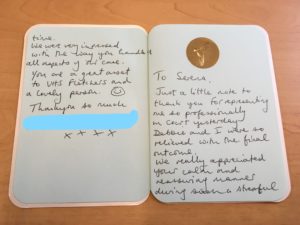All posts by Andrew Wesley/h3>
Our solicitors are often instructed in cases involving allegations of domestic violence. The complainants in some of these cases do not support the prosecution. This lack of support was indicated at a very early stage. None of the witnesses made statements when the police were investigating the allegations. The prosecution try to rely on hearsay res gestae evidence.
As a result, the prosecution has sought to rely entirely on hearsay evidence. In particular, the res gestae exception as preserved by Section 11(4) Criminal Justice Act 2003 has been relied upon.
The test for admitting res gestae evidence
Evidence amounts to res gestae when “the statement was made by a person so emotionally overpowered by an event that the possibility of concoction or distortion can be disregarded”.
This principle has been developed in subsequent case law. As a result the following points have been established which the court should consider in deciding whether to allow a Prosecution application to admit the evidence:
- Ultimately, the Court has to determine whether the possibility of concoction or distortion can be disregarded;
- The court will need to look at the particular circumstances in which the relevant statement has been made.
- It must be satisfied that that the event was so unusual, startling or dramatic that it was the predominant thought of the witness.
- Their statement was an instinctive reaction so there was no real opportunity for reasoned reflection.
- The statement must be closely associated with the relevant event. The court must be sure that the event was still operating to effect the mind of the witness when the statement was made.
- Does the case have particularly features which relate directly to the possibility of concoction or distortion. This might include evidence of fabrication. The court must be satisfied that there was no such possibility of concoction or distortion.
Any issues such as mistakes in the account given are not matters relevant to admissibility of the evidence but factors the court will consider in deciding what weight to give to such evidence.
There is clear case law that the prosecution should not make an application to admit res gestae to circumvent other statutory hearsay provisions.
What evidential matters will the court look at?
The issue of the timing of the statement will be key to any application. These will include:
- when the victim called the police
- how soon after the incident the victim gave the account said to be res gestae
These are not the only factors that the Court should consider however. The Court will also need to look at:
- whether there is any supporting evidence for example visible injuries
- the victim’s demeanour when first witnesses attend
- their subsequent words and behaviour
- is there an accurate transcription of recorded evidence such as 999 calls, police bodycam footage or CCTV evidence
- where the victim has made more than one statement, the accuracy and consistency of those statements will need careful consideration
- if there has been more than one telephone call or electronic communication have been made by the same person?
Ultimately each case has to be considered on its own facts.
Should the prosecution give notice of an application?
The Criminal Procedure Rules do not require the prosecution to give notice of an application to admit hearsay evidence under the res gestae principles. Any notice given very much depends on the prosecutor dealing with the particular case. Where an application is made in advance and refused the case will end at that stage unless there is other admissible evidence to secure a conviction.
Even where a court admits res gestae evidence it must still evaluate that evidence in the usual way. The prosecution must still proved its case to the required standard.
Exclusion of hearsay evidence under section 78 PACE 1984
A defendant has an opportunity to apply to exclude evidence of res gestae. If a court has admitted the evidence, application can be made under Section 78 of Police and Criminal Evidence Act 1984. The court has a discretion to exclude evidence which would otherwise be admissible.
For example, there may be cases where the prosecution have failed to take sufficient steps to ensure a witness’s attendance at court. The prosecution might have purported to tender the prosecution to the defence. This means that the defendant would be at liberty to call the witness.
Circumstances like these might permit a persuasive argument that the defendant has been denied an opportunity to test the evidence through cross examination of the witness.
An application to admit hearsay evidence should be an application of last resort. In many cases the prosecution will attempt such an application when a witness might be available to give evidence as to the facts.
In the case of R v Andrews it was stated that a court should “strongly deprecate any attempt in criminal prosecutions to use the doctrine [of res gestae]as a device to avoid calling, when he is available, the maker of the statement”.
Contact a specialist criminal defence solicitor
On behalf of a defendant, a solicitor must make sure that the prosecution does not use a res gestae application to place otherwise inadmissible hearsay evidence before the court. Solicitors must ensure that the statutory and procedural safeguards are used to ensure a defendant’s right to a fair trial.
A defendant will wish to instruct a solicitor who is alive to all of the issues relating to this evidence and prepared for an argument at short notice against the admissibility of re gestae.
If you face allegations before the court where the decisive evidence is that of an absent witness then contact your nearest office to speak to a specialist criminal defence solicitor. Alternatively you can use the form below.
Legal aid will often be available to ensure that the defence of your case will be free of charge to you.








